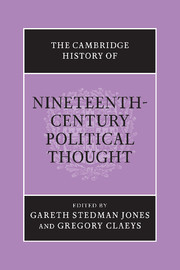Book contents
- Frontmatter
- Contents
- Contributors
- Acknowledgements
- Introduction
- I Political thought after the French Revolution
- II Modern liberty and its defenders
- 8 From Jeremy Bentham's radical philosophy to J. S. Mill's philosophic radicalism
- 9 John Stuart Mill, mid-Victorian
- 10 The ‘woman question’ and the origins of feminism
- 11 Constitutional liberalism in France
- 12 American political thought from Jeffersonian republicanism to progressivism
- 13 German liberalism in the nineteenth century
- 14 Visions of stateless society
- III Modern liberty and its critics
- IV Secularity, reform and modernity
- Biographies
- Bibliography
- Index
9 - John Stuart Mill, mid-Victorian
from II - Modern liberty and its defenders
Published online by Cambridge University Press: 28 July 2011
- Frontmatter
- Contents
- Contributors
- Acknowledgements
- Introduction
- I Political thought after the French Revolution
- II Modern liberty and its defenders
- 8 From Jeremy Bentham's radical philosophy to J. S. Mill's philosophic radicalism
- 9 John Stuart Mill, mid-Victorian
- 10 The ‘woman question’ and the origins of feminism
- 11 Constitutional liberalism in France
- 12 American political thought from Jeffersonian republicanism to progressivism
- 13 German liberalism in the nineteenth century
- 14 Visions of stateless society
- III Modern liberty and its critics
- IV Secularity, reform and modernity
- Biographies
- Bibliography
- Index
Summary
Looking back on John Stuart Mill, we see him as the most important English philosopher of his century. For us, he fits naturally into what we think of as a British empiricist tradition between Hume in the previous century and Russell in the next. Yet this is not how Mill himself would have thought of his work. ‘Empiricism’ was something he criticised and wished to avoid. Nor did he look back to Hume. Instead, he looked back to his father, James Mill. His father, he thought, provided the most advanced analysis of the human mind, which for Mill was the central key to all philosophy. And, again following his father, he looked back before him to the account of the mind in David Hartley, building on Locke.
- Type
- Chapter
- Information
- The Cambridge History of Nineteenth-Century Political Thought , pp. 295 - 318Publisher: Cambridge University PressPrint publication year: 2011
- 1
- Cited by

